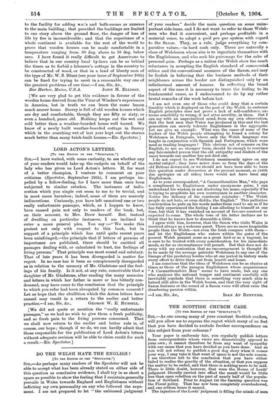[To THE EDITOR OF THE "SPECTATOR."] Sni.,—As perhaps many readers
of the Spectator will not be able to accept what has been already stated on either side of this question as conclusive evidence, I shall try in as short a space as possible to show the feeling that I maintain generally prevails in Wales towards England and Englishmen without inflicting my own personality on any who followed the argu- ment. I am not prepared to let "the unbiassed judgment of your readers" decide the main question on some unim- portant side-issue, and I do not want to refer to those Welsh. men who find it convenient, and perhaps profitable in a material sense, to adopt a quid pro quo system with regard to the Saxon. They, as a rule, judge everything by com- parative values,—in hard cash only. There are naturally a class of Welshmen whose aim is to ingratiate themselves with the Englishman, and who seek his patronage for the sake of personal gain. Perhaps as a nation the Welsh show too much reluctance in accepting the English standard of commercial ethics and the conventional manners of the Saxon, and may be• foolish in believing that the business methods of their neighbours across the border are distinguished only by an infinitesimal amount of honour. In reflecting the broad aspect of the case it is necessary to trace the feeling to its fundamental cause, as I endeavoured to do by my rather
brutal remarks of the week before last.
I am not even one of those who could deny that a certain timidity which is displayed on the part of the Welsh to embrace English principles does not prove a lack of self-confidence, ex- treme sensibility to wrong, if not utter servility, in them. But I can say with an unprejudiced mind, from my own observation, that the best men that Wales has produced in this and the last generation can merely tolerate Englishmen in the aggregate. Let me give an example. What was the cause of some of the leaders of the Welsh people attempting to found a colony for Welshmen in Patagonia, where only the Welsh language was taught in conjunction with Spanish and Portuguese, which were used as trading languages ? This obvious act of censure on the English, to use no stronger term, should be enough to convince any fair-minded person that the old antipathy and disdain of the races towards one another has not died out.
I do not expect to see Welshmen unanimously agree on any mortal subject; they have never, done so from the days of the old Britons downward, or we should not have been able to have this question under discussion at the present moment, as (with due apologies on all sides) there would not have been any Englishmen.
As to your correspondent, "A Carmarthenshire Man," who pays a compliment to Englishmen under anonymous guise, I can understand his wisdom in not disclosing his name, especially if he is trying to propitiate his own countrymen in another character. Notice the delicacy of his courteous rejoinder : "The Welsh people do not hate, or even dislike, the English." This palliative construction he puts on his words makes them read to me as if he has fully experienced the feeling I am alluding to himself at one time, but that it has vanished on account of favours received or expected to come. The whole tone of his letter inclines me to think that he knows how to dissemble a little.
I agree with him, however, that the Saxon who visits Wales is received always as a welcome guest. There are no more hospitable people than the Welsh—not even the Irish compare with them— and let the Englishman who enters within the gates of the poorest Welsh peasant come as a great lord or as a vagrant, he is sure to be treated with every consideration for his immediate needs, as far as circumstances will permit. But that does not do away with my contention that no encouragement is thought fit to be made by the average patriotic Welshman to any one of the lineage of the predatory hordes who at one period in history made every effort to drive them out from hearth and home.
I am conscious that the ideas of Welshmen can be as elusive at times as those of the paragon Englishmen whose acquaintance "A Carmarthenshire Man" seems to have made, but any one who analyses the national temper and sentiment carefully will inevitably conclude that there is something very much akin to hatred still alive in the Welsh bosom, and that the very sight of Saxon features or the sound of a Saxon voice will often raise the slumbering passion within.










































 Previous page
Previous page